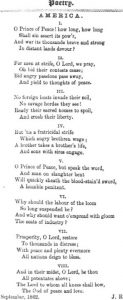
Searching for Lancashire Cotton Famine poetry, like any research based around identification, collation, and interpretation, is in equal measures exhausting and thrilling. Most examples of this kind of poetry are held in local newspaper archives, and because they were largely written by ordinary people in response to a particular historical event (these poems are, in this sense, ‘occasional’) they have remained ‘hidden’ there since they were published. The archives are kept for the most part in local libraries, and in most cases they are preserved on microfilm. For the researcher this means a seemingly endless parade of microfilm readers of varying quality and functionality which range from the relatively high-tech all-singing all-dancing flavour, to the kind of machine which would look comfortable in a 1970s episode of Dr Who. It also means the development of a dab hand at wheeling the film back and forth, either electronically or manually, depending on the reader. Of course, we are lucky that we are searching for poetry, which looks very different on the page from prose (surely one working definition of poetry) and so stands out from the millions of surrounding words in the newsprint. We are also lucky that many Victorian newspapers preferred to publish their poems in the same place on the page week in week out.
Legibility is an issue. We should be thankful that local authorities have funded the copying of rapidly decaying local historical newspapers and that we have these images, but the quality of reproduction is not always of the highest. Smudges, paper curls, folds, and slanted images are our sworn enemies, and sometimes we must battle these with our knowledge of Victorian diction and rhyme in order to fill in the gaps. And we should always remember that often, this is all we have. There are two myths which should be dispelled. The first is that this kind of material is being rapidly digitised by some benevolent literary body with endless financial and human resources, and the second is that the British Library holds copies of everything that was ever published. Neither of these are true and hence the preservation aspect of our work is particularly important. Every time one of these poems is converted into a digital file through Optical Character Recognition, or in the case of our illegibly smudged little friends, actually transcribed by hand into a digital text, I breathe a sigh of relief.
Of course, the pay-off for all this work is the kind of text I have provided an example of above, which was discovered by Francesca Howard, an intern who worked on this project early on. This piece was published in the Blackburn Standard on October 15th 1862 and explicitly comments on the ongoing American Civil war and calls for its immediate end, identifying it as the direct cause of the ‘distress’ in Lancashire, as well as its bloodshed and horrors. Its condemnation of ‘fratricide’ is strikingly even-handed, and there is no sense here of partisan support for the anti-slavery cause of the Union to which British workers were traditionally thought to be sympathetic. The poem is clearly pacifist in a religious manner, but the sixth stanza is striking in its outrage that the globalised trade in cotton has been interrupted by war. Tantalisingly for me, ‘J. R.’ could be the great Mancunian dialect poet and journalist of the time, Joseph Ramsbottom, but until we find the text in some kind of corroborating context, this is just speculation.
The next blog entry will detail some of the partners of the project who are helping us to bring these texts alive again in various ways. We are grateful to all of these individuals and institutions, but for the moment I will just leave you with links to the websites of two of the musical partners to the project, who will be working to set some of the texts to music, for live and recorded performance. More details will be forthcoming…
http://jenniferreid.weebly.com/
Dr Simon Rennie
University of Exeter
